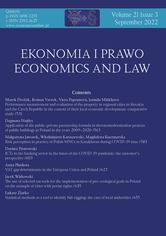Performance measurement and evaluation of the property in regional cities in Slovakia and the Czech Republic in the context of their local economic development: comparative study
Performance measurement and evaluation of the property in regional cities in Slovakia and the Czech Republic in the context of their local economic development: comparative study
Author(s): MAREK DVOŘÁK, Roman Vavrek, Viera Papcunova, Jarmila MižičkováSubject(s): Public Administration, Government/Political systems, Rural and urban sociology, Economic development
Published by: Wydawnictwo Naukowe Uniwersytetu Mikołaja Kopernika
Keywords: municipal property; performance measurement; regional city; FAMA indicators;
Summary/Abstract: Motivation: Property is an important part of the economic development of local governments. Not only from the point of view of its use for providing services to inhabitants, but also from the point of view of generating income for local budgets. However, the evaluation of its use is very complicated, since cities first of all use it for non-market purposes and only then for market purposes. There are very few studies devoted to the evaluation of property utilization at the level of local self-governments. Aim: The financing of cities in Slovakia and Czechia is strongly linked to the state budget, and a large part of these financial resources are earmarked. One of the possibilities for obtaining additional financial resources, as well as increasing their competitiveness, is the efficient use of municipal property. The aim of this paper is to look at the competitiveness of regional cities by evaluating the use of property in Slovakia and Czechia, in the time series 2000–2019 and based on selected indicators. Results: The results of the analysis showed significant differences between regional cities in Slovakia and the Czech Republic. Prague is overcapitalized, whereas Bratislava is undercapitalized in selected indicators. At the same time, in the Czech Republic we observe the significant dominance of large cities, while the results of the others cities do not show significant differences. Property as its own economic resource is becoming an important part of the competitiveness of cities. Municipal property consists of things owned by the municipality, which are primarily immovable (land, buildings, individual components of the technical infrastructure), and it is this property that significantly affects the development of cities. The research method represents a new way to evaluate the efficiency of municipal property. Municipal property, which is made up primarily of long-term intangible property, represents an important element of the competitiveness of cities, because cities can use it as a tool to attract investors to the territory, thereby increasing the overall socio-economic development of the territory.
Journal: Ekonomia i Prawo. Economics and Law
- Issue Year: 21/2022
- Issue No: 3
- Page Range: 531-561
- Page Count: 32
- Language: English

